Unit 5 Do you have a soccer ball? SectionA 1a-2d课件2022-2023学年人教版七年级英语上册(共24张PPT)
文档属性
| 名称 | Unit 5 Do you have a soccer ball? SectionA 1a-2d课件2022-2023学年人教版七年级英语上册(共24张PPT) | 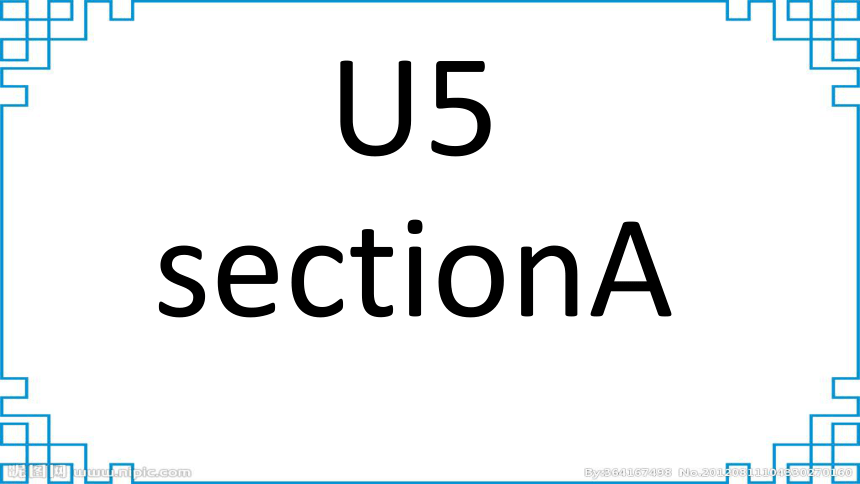 | |
| 格式 | zip | ||
| 文件大小 | 283.9KB | ||
| 资源类型 | 教案 | ||
| 版本资源 | 人教新目标(Go for it)版 | ||
| 科目 | 英语 | ||
| 更新时间 | 2022-09-15 08:06:43 | ||
图片预览

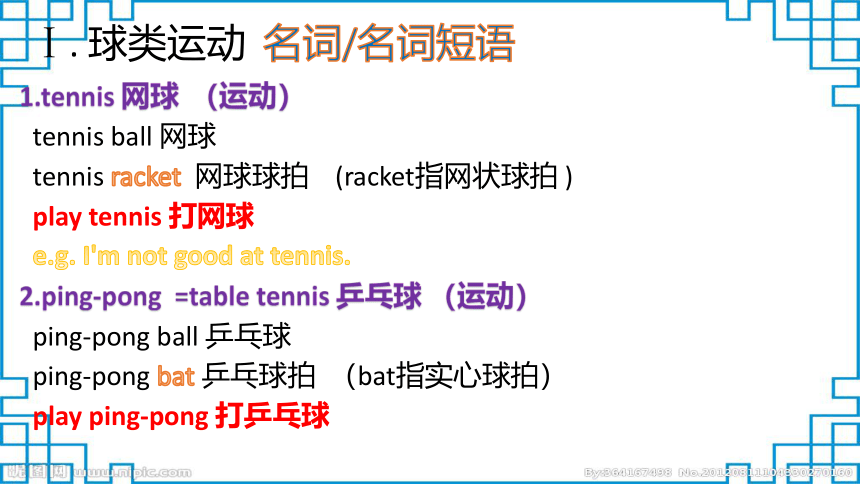

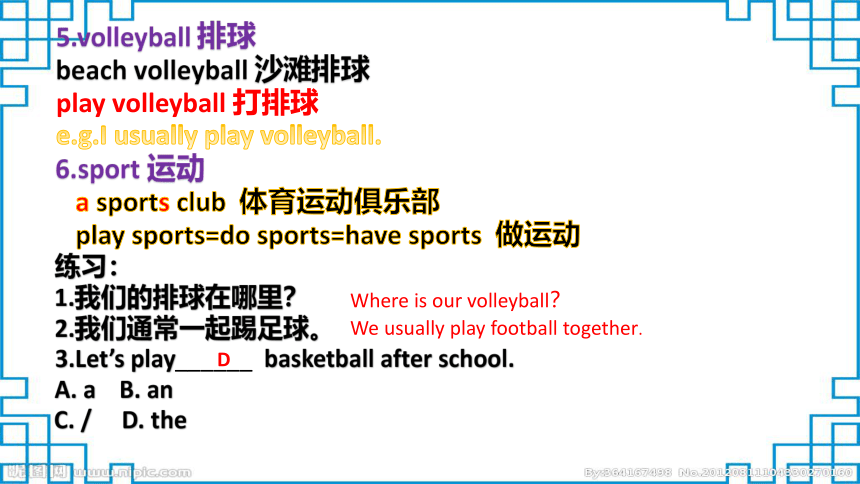
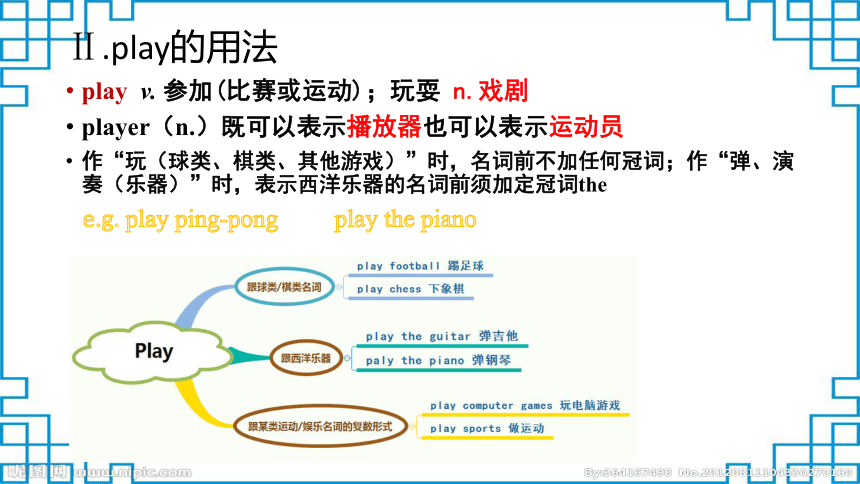
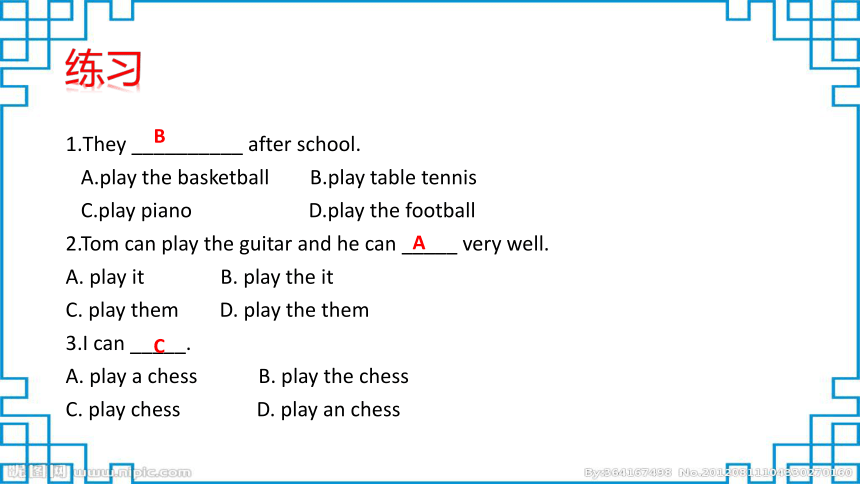
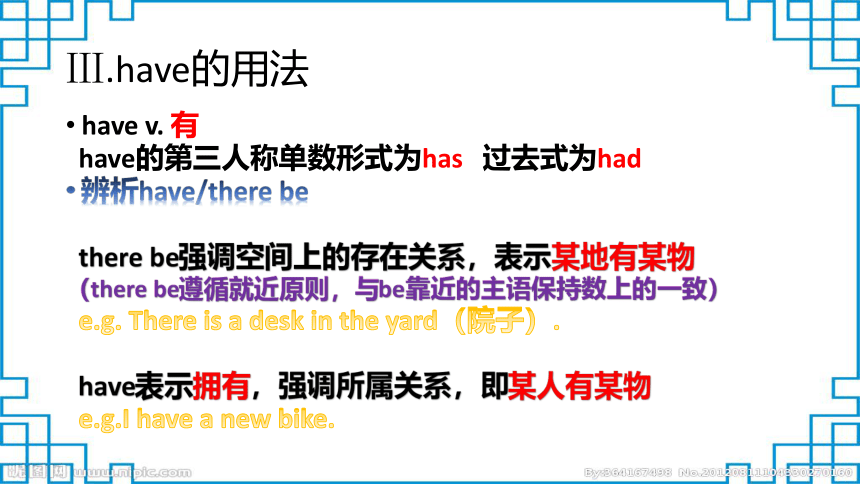
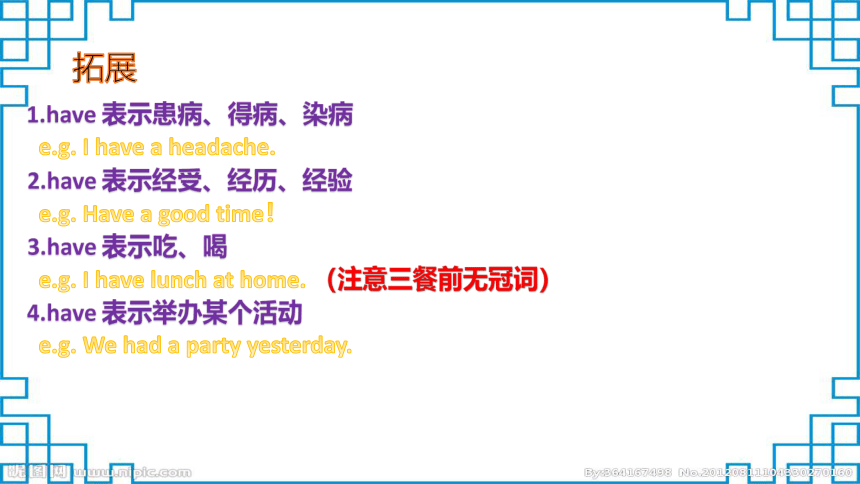
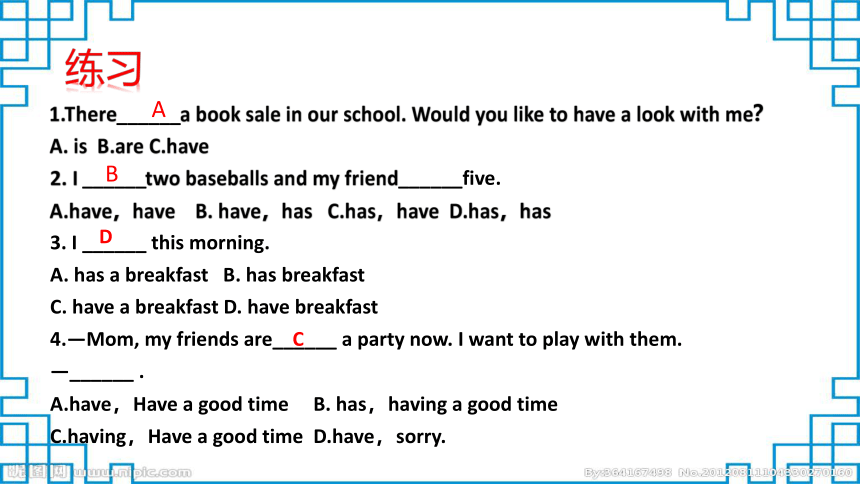
文档简介
(共24张PPT)
U5 sectionA
Ⅰ. 球类运动 名词/名词短语
1.tennis 网球 (运动)
tennis ball 网球
tennis racket 网球球拍 (racket指网状球拍 )
play tennis 打网球
e.g. I'm not good at tennis.
2.ping-pong =table tennis 乒乓球 (运动)
ping-pong ball 乒乓球
ping-pong bat 乒乓球拍 (bat指实心球拍)
play ping-pong 打乒乓球
3.soccer 英式足球=football 美式足球 (运动)
soccer ball 足球
play soccer/football 踢足球
soccer field 足球场
e.g.He often watches soccer matches.
4.basketball 篮球 (basket:篮子 复合名词)
play basketball 打篮球
basketball team 篮球队
national basketball association 国家篮球协会(简称NBA)
e.g.I enjoy playing basketball.
5.volleyball 排球
beach volleyball 沙滩排球
play volleyball 打排球
e.g.I usually play volleyball.
6.sport 运动
a sports club 体育运动俱乐部
play sports=do sports=have sports 做运动
练习:
1.我们的排球在哪里?
2.我们通常一起踢足球。
3.Let’s play______ basketball after school.
A. a B. an
C. / D. the
D
Where is our volleyball?
We usually play football together.
Ⅱ.play的用法
play v. 参加(比赛或运动);玩耍 n.戏剧
player(n.)既可以表示播放器也可以表示运动员
作“玩(球类、棋类、其他游戏)”时,名词前不加任何冠词;作“弹、演奏(乐器)”时,表示西洋乐器的名词前须加定冠词the
e.g. play ping-pong play the piano
练习
1.They __________ after school.
A.play the basketball B.play table tennis
C.play piano D.play the football
2.Tom can play the guitar and he can _____ very well.
A. play it B. play the it
C. play them D. play the them
3.I can _____.
A. play a chess B. play the chess
C. play chess D. play an chess
B
A
C
Ⅲ.have的用法
have v. 有
have的第三人称单数形式为has 过去式为had
辨析have/there be
there be强调空间上的存在关系,表示某地有某物
(there be遵循就近原则,与be靠近的主语保持数上的一致)
e.g. There is a desk in the yard(院子).
have表示拥有,强调所属关系,即某人有某物
e.g.I have a new bike.
1.have 表示患病、得病、染病
e.g. I have a headache.
2.have 表示经受、经历、经验
e.g. Have a good time!
3.have 表示吃、喝
e.g. I have lunch at home. (注意三餐前无冠词)
4.have 表示举办某个活动
e.g. We had a party yesterday.
拓展
练习
1.There______a book sale in our school. Would you like to have a look with me?
A. is B.are C.have
2. I ______two baseballs and my friend______five.
A.have,have B. have,has C.has,have D.has,has
3. I ______ this morning.
A. has a breakfast B. has breakfast
C. have a breakfast D. have breakfast
4.—Mom, my friends are______ a party now. I want to play with them.
—______ .
A.have,Have a good time B. has,having a good time
C.having,Have a good time D.have,sorry.
A
B
D
C
Ⅳ.let的用法
let后接动词原形。常引导祈使句,用于向别人提出建议或征求别
人的意见,意为“让某人做……吧。”
let/have/make sb. (not) do sth 让某人(不要)做某事
e.g. Let me have a look.
辨析let’s/let us(let’s 是let us的缩写 但用法不同)
let’s指的是包括听话者在内
let us指的是不包括听话者在内
表示提建议的方式
1.Why not do? 为什么不...?=Why don’t you do? 你为什么不...?
2.Let’s do sth. 让我们...
3.had better do sth. 最好...
4.What/How about doing sth.
回答:
肯定:OK./That’s all right.
That’s sounds great./Good idea.
否定:Sorry+原因
练习
1. Let’s ______ soccer together.
A.to play B. playing
C.play D.played
2.-____ lunch.
-That sounds good.
A.Let have B.Let's have
C.Let's to have D.Let us to have
3.I would like ____________ to the park tomorrow. Why not
__________ with me
A.to go; to go B.to go; go C.go; to go D.go; go
C
B
B
Ⅴ.go的用法
go v. 去 go≠come 其第三人称单数形式为goes 过去式为went
go后加v.-ing表示去做...
常用go to +地点名词/go+地点副词(home/here/there)的结构
e.g I go to school by bike everyday.
相关短语
go shopping 去购物
go fishing 去钓鱼
go for a walk 去散步
go to school 去学校
go to bed 上床睡觉
练习
1.It’s hot today. Let’s go_____.
A.swim B. to swim
C.swimming D.swam
2.We usually_____school at seven thirty in the morning and _____
home after school at half past four in the afternoon.
A.go;go B.go to;go to C.go to;go D.go;go to
3、His mother wants __________.
A.go to shopping B.to go shop
C.to go shopping D.go shopping
C
C
C
Ⅵ.late的用法
late adj. 迟到的
be late for 迟到 (常跟名词短语)
e.g. You are late for school today.
late adv.迟地、晚地
e.g. He gets up late today.
相关短语
get up late 起床迟
be late for school 上学迟到
in his late twenties 在他快三十岁的时候
Better late than never. 迟做比不做好
练习
1.The twins ________ school in the morning.
A.is often late for B.are often late for
C.often is late for D.often are late for
2.I don't want to ________school.
A.be late to
B.be late for
C.late to
D.late for
B
B
Ⅶ.get的用法
get v. 去取(或带来);得到
get-got-gotten
相关短语
get out 出去
get up 起床
get on/off 上/下车
get to 到达
get on with sb. 与某人相处
get in trouble 惹麻烦
e.g.She gets up at 5 o’clock every morning.
辨析get,bring,take,carry
get:去拿,指从说话人所在地出发,到达别处后再带着某物返回,表示的动作是一个来回
e.g.Ann, get some milk for me.
bring:带来,指从别处拿到说话者和听话者要去的地方,动作是单向的
e.g.Please bring your homework to school tomorrow.
take:带走,指把某物从说话处带走,动作是单向的
e.g.May I take this book home?
carry:表示搬运,不强调方向,有负重之意
e.g.Can you help me carry the box?
练习
1.I will ________ the bus at the next station.
A.get out B.get to C.get off D.get in
2.Can you________these things to your sister, Tom
A. take B. bring C. get
3.—Shall we _______ Tom _____ the zoo this morning
A.take , / B.take , go
C.take , to D.take , to go
C
A
B
Ⅷ.great的用法
1.在口语中独立成句,表示说话人的喜悦之情。
e.g. -Let’s play volleyball. -Great!
2.adj.美妙的、伟大的、优秀的
在句子中可以做表语也可以做定语
e.g. It’s great today.
Tu Youyou is a great scientist.
3.固定搭配: the Great Wall 长城
Ⅸ.sound
sound v. 听起来好
n.声音
sound like 听起来像...(+名词、代词、v.-ing)
e.g.That sounds like a good idea.
感官动词(+adj./n./介词短语)
look v. 看起来;smell v. 闻起来;taste v.尝起来;feel v.摸起来
1. 根据首字母提示填写单词
- Let’s play soccer.- That s_____ good. I like it.
2. - What a sunny day! What about going cycling(去骑自行车)? - ________.
A. No, I don’t mind B. You’d better not
C. That sounds great D. You’re welcome
3.(铁岭中考)The cover of the book_____comfortable. It’s made of silk.
A. tastes B.feels
C. looks D. sounds
B
ounds
C
不,我不介意
你最好不要
Thanks for listening!
U5 sectionA
Ⅰ. 球类运动 名词/名词短语
1.tennis 网球 (运动)
tennis ball 网球
tennis racket 网球球拍 (racket指网状球拍 )
play tennis 打网球
e.g. I'm not good at tennis.
2.ping-pong =table tennis 乒乓球 (运动)
ping-pong ball 乒乓球
ping-pong bat 乒乓球拍 (bat指实心球拍)
play ping-pong 打乒乓球
3.soccer 英式足球=football 美式足球 (运动)
soccer ball 足球
play soccer/football 踢足球
soccer field 足球场
e.g.He often watches soccer matches.
4.basketball 篮球 (basket:篮子 复合名词)
play basketball 打篮球
basketball team 篮球队
national basketball association 国家篮球协会(简称NBA)
e.g.I enjoy playing basketball.
5.volleyball 排球
beach volleyball 沙滩排球
play volleyball 打排球
e.g.I usually play volleyball.
6.sport 运动
a sports club 体育运动俱乐部
play sports=do sports=have sports 做运动
练习:
1.我们的排球在哪里?
2.我们通常一起踢足球。
3.Let’s play______ basketball after school.
A. a B. an
C. / D. the
D
Where is our volleyball?
We usually play football together.
Ⅱ.play的用法
play v. 参加(比赛或运动);玩耍 n.戏剧
player(n.)既可以表示播放器也可以表示运动员
作“玩(球类、棋类、其他游戏)”时,名词前不加任何冠词;作“弹、演奏(乐器)”时,表示西洋乐器的名词前须加定冠词the
e.g. play ping-pong play the piano
练习
1.They __________ after school.
A.play the basketball B.play table tennis
C.play piano D.play the football
2.Tom can play the guitar and he can _____ very well.
A. play it B. play the it
C. play them D. play the them
3.I can _____.
A. play a chess B. play the chess
C. play chess D. play an chess
B
A
C
Ⅲ.have的用法
have v. 有
have的第三人称单数形式为has 过去式为had
辨析have/there be
there be强调空间上的存在关系,表示某地有某物
(there be遵循就近原则,与be靠近的主语保持数上的一致)
e.g. There is a desk in the yard(院子).
have表示拥有,强调所属关系,即某人有某物
e.g.I have a new bike.
1.have 表示患病、得病、染病
e.g. I have a headache.
2.have 表示经受、经历、经验
e.g. Have a good time!
3.have 表示吃、喝
e.g. I have lunch at home. (注意三餐前无冠词)
4.have 表示举办某个活动
e.g. We had a party yesterday.
拓展
练习
1.There______a book sale in our school. Would you like to have a look with me?
A. is B.are C.have
2. I ______two baseballs and my friend______five.
A.have,have B. have,has C.has,have D.has,has
3. I ______ this morning.
A. has a breakfast B. has breakfast
C. have a breakfast D. have breakfast
4.—Mom, my friends are______ a party now. I want to play with them.
—______ .
A.have,Have a good time B. has,having a good time
C.having,Have a good time D.have,sorry.
A
B
D
C
Ⅳ.let的用法
let后接动词原形。常引导祈使句,用于向别人提出建议或征求别
人的意见,意为“让某人做……吧。”
let/have/make sb. (not) do sth 让某人(不要)做某事
e.g. Let me have a look.
辨析let’s/let us(let’s 是let us的缩写 但用法不同)
let’s指的是包括听话者在内
let us指的是不包括听话者在内
表示提建议的方式
1.Why not do? 为什么不...?=Why don’t you do? 你为什么不...?
2.Let’s do sth. 让我们...
3.had better do sth. 最好...
4.What/How about doing sth.
回答:
肯定:OK./That’s all right.
That’s sounds great./Good idea.
否定:Sorry+原因
练习
1. Let’s ______ soccer together.
A.to play B. playing
C.play D.played
2.-____ lunch.
-That sounds good.
A.Let have B.Let's have
C.Let's to have D.Let us to have
3.I would like ____________ to the park tomorrow. Why not
__________ with me
A.to go; to go B.to go; go C.go; to go D.go; go
C
B
B
Ⅴ.go的用法
go v. 去 go≠come 其第三人称单数形式为goes 过去式为went
go后加v.-ing表示去做...
常用go to +地点名词/go+地点副词(home/here/there)的结构
e.g I go to school by bike everyday.
相关短语
go shopping 去购物
go fishing 去钓鱼
go for a walk 去散步
go to school 去学校
go to bed 上床睡觉
练习
1.It’s hot today. Let’s go_____.
A.swim B. to swim
C.swimming D.swam
2.We usually_____school at seven thirty in the morning and _____
home after school at half past four in the afternoon.
A.go;go B.go to;go to C.go to;go D.go;go to
3、His mother wants __________.
A.go to shopping B.to go shop
C.to go shopping D.go shopping
C
C
C
Ⅵ.late的用法
late adj. 迟到的
be late for 迟到 (常跟名词短语)
e.g. You are late for school today.
late adv.迟地、晚地
e.g. He gets up late today.
相关短语
get up late 起床迟
be late for school 上学迟到
in his late twenties 在他快三十岁的时候
Better late than never. 迟做比不做好
练习
1.The twins ________ school in the morning.
A.is often late for B.are often late for
C.often is late for D.often are late for
2.I don't want to ________school.
A.be late to
B.be late for
C.late to
D.late for
B
B
Ⅶ.get的用法
get v. 去取(或带来);得到
get-got-gotten
相关短语
get out 出去
get up 起床
get on/off 上/下车
get to 到达
get on with sb. 与某人相处
get in trouble 惹麻烦
e.g.She gets up at 5 o’clock every morning.
辨析get,bring,take,carry
get:去拿,指从说话人所在地出发,到达别处后再带着某物返回,表示的动作是一个来回
e.g.Ann, get some milk for me.
bring:带来,指从别处拿到说话者和听话者要去的地方,动作是单向的
e.g.Please bring your homework to school tomorrow.
take:带走,指把某物从说话处带走,动作是单向的
e.g.May I take this book home?
carry:表示搬运,不强调方向,有负重之意
e.g.Can you help me carry the box?
练习
1.I will ________ the bus at the next station.
A.get out B.get to C.get off D.get in
2.Can you________these things to your sister, Tom
A. take B. bring C. get
3.—Shall we _______ Tom _____ the zoo this morning
A.take , / B.take , go
C.take , to D.take , to go
C
A
B
Ⅷ.great的用法
1.在口语中独立成句,表示说话人的喜悦之情。
e.g. -Let’s play volleyball. -Great!
2.adj.美妙的、伟大的、优秀的
在句子中可以做表语也可以做定语
e.g. It’s great today.
Tu Youyou is a great scientist.
3.固定搭配: the Great Wall 长城
Ⅸ.sound
sound v. 听起来好
n.声音
sound like 听起来像...(+名词、代词、v.-ing)
e.g.That sounds like a good idea.
感官动词(+adj./n./介词短语)
look v. 看起来;smell v. 闻起来;taste v.尝起来;feel v.摸起来
1. 根据首字母提示填写单词
- Let’s play soccer.- That s_____ good. I like it.
2. - What a sunny day! What about going cycling(去骑自行车)? - ________.
A. No, I don’t mind B. You’d better not
C. That sounds great D. You’re welcome
3.(铁岭中考)The cover of the book_____comfortable. It’s made of silk.
A. tastes B.feels
C. looks D. sounds
B
ounds
C
不,我不介意
你最好不要
Thanks for listening!
同课章节目录
- starters 预备篇(2012秋审查)
- Unit 1 Good morning !
- Unit 2 What’s this in English?
- Unit 3 What color is it ?
- Unit 1 My name's Gina.
- Section A
- Section B
- Unit 2 This is my sister.
- Section A
- Section B
- Unit 3 Is this your pencil?
- Section A
- Section B
- Unit 4 Where's my schoolbag?
- Section A
- Section B
- Unit 5 Do you have a soccer ball?
- Section A
- Section B
- Unit 6 Do you like bananas?
- Section A
- Section B
- Unit 7 How much are these socks?
- Section A
- Section B
- Unit 8 When is your birthday?
- Section A
- Section B
- Unit 9 My favorite subject is science.
- Section A
- Section B
